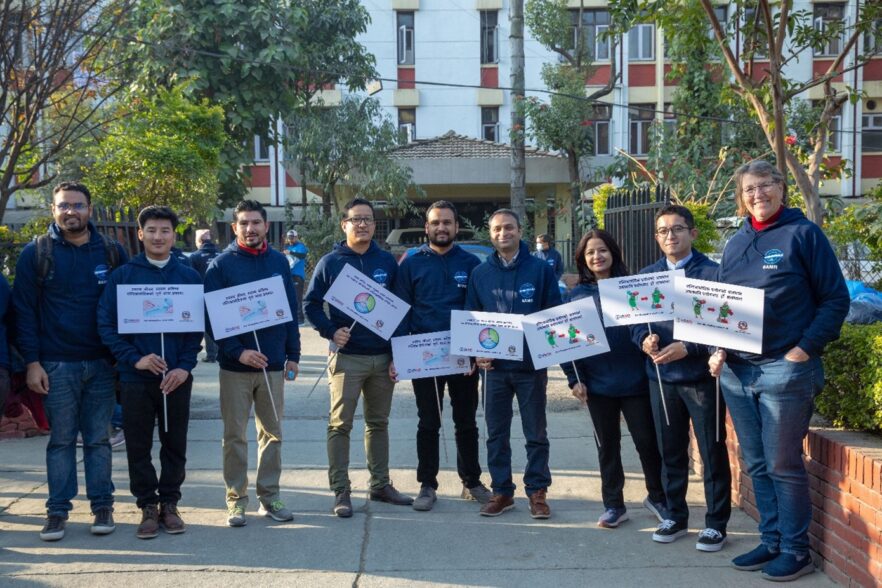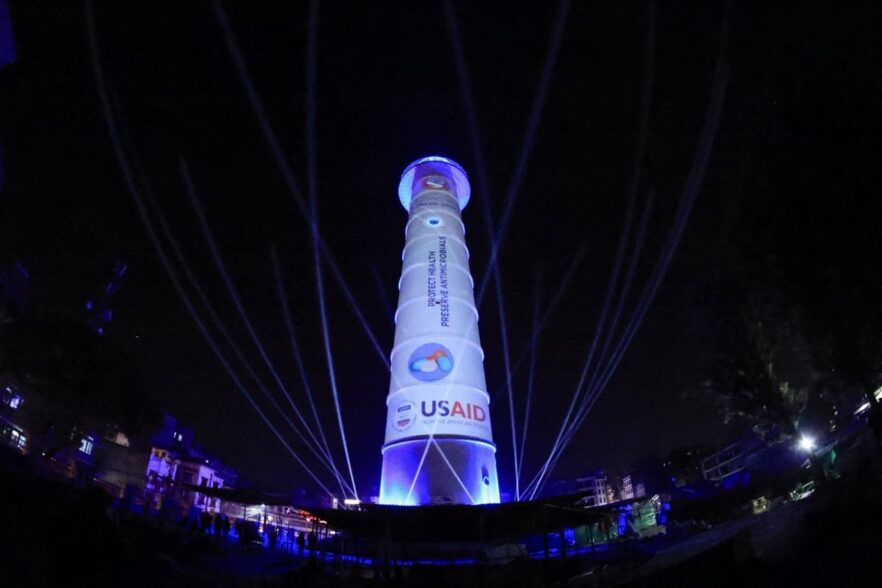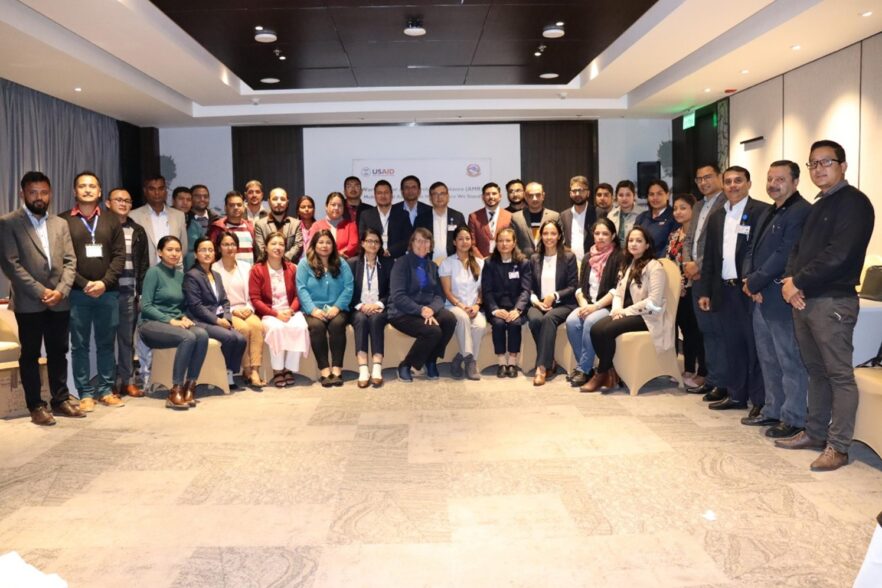Strengthening One Health Initiative for Antimicrobial Resistance Containment in Nepal
By Santosh Dulal, Birna Trap, and Mohan P. Joshi, USAID MTaPS Program
Antimicrobial resistance (AMR) poses a serious global and multidimensional threat to communities and societies, health systems, agriculture food/feed production, and environmental health, impeding progress on sustainable development and universal health coverage goals. One of the 10 most significant global public health threats and a leading cause of death worldwide (WHO 2021), AMR places the highest burden on low-resource settings, with an estimated 4.95 million deaths associated with bacterial AMR in 2019.
Like in other countries, this rapidly escalating public-health threat has significantly affected Nepal. A large body of literature related to the AMR situation in Nepal indicates alarmingly high levels of irrational use of antimicrobials in humans as well as in animals, including those raised for food. Clinical studies show that a multitude of pathogens from health care settings have become resistant to widely used antibiotics in Nepal.
Longstanding Commitment to Strengthening AMR Surveillance and Regulation
Nepal has focused on AMR as a priority since signing the Jaipur Declaration on AMR in 2011, after which it drafted a “National AMR Containment Action Plan 2016” that was aligned with the WHO Global Action Plan 2015. However, that Nepal plan was never officially endorsed, so the country subsequently drafted the National Action Plan on AMR (NAP-AMR) 2021–2026, which incorporates a One Health approach with multisectoral engagement.
The NAP-AMR is now in the process of being endorsed by the cabinet of ministers. Meanwhile, a multisectoral steering committee on AMR was formed and has already held a few formal meetings for policy-level decisions on AMR. Five national technical working groups, one for each strategic NAP-AMR priority area, are also in place.
The country’s AMR surveillance system was launched in 1999 with USAID support, leading to a number of policy- and implementation-level efforts:

The World Antimicrobial Awareness Week (WAAW) 2022 Walkathon organized by the Ministry of Health and Population with multisectoral engagement displaying placards wit key AMR awareness messages in native Nepali language. Photo credit: MTaPS Nepal
- The designated national coordinating center for AMR surveillance, the National Public Health Laboratory, has been conducting Global Antimicrobial Resistance Surveillance System (GLASS) reporting for 10 priority pathogens from 22 sentinel sites.
- Seven veterinary laboratories have been evaluated through the Food and Agriculture Organization’s Assessment Tool for Laboratories and AMR Surveillance Systems (ATLASS) database.
- The Central Veterinary Laboratory initiated AMR surveillance in the poultry sector, along with an epidemic investigation of livestock diseases.
- A survey on farm-based antimicrobial use in poultry was conducted by the Veterinary Standards and Drug Regulatory Laboratory at six clusters covering all seven provinces.
- The Department of Food Technology and Quality Control started AMR surveillance in the food and feed sectors.
- The Nepal government approved the National Food Safety Policy–2076 (2019).
Some of the gaps identified in the AMR surveillance data-collection process relate to completeness, consistency, and timeliness. Other areas that need improvement include the enforcement of regulations, the strengthening of both laboratory settings and the surveillance system based on a One Health approach, and the implementation of sustainable public awareness campaigns aimed at changing health-seeking behavior and improving the rational use of antimicrobials.

WAAW “Go Blue for AMR” campaign at the historical Dharahara Tower in Kathmandu on Novemeber 24, 2022, displaying key AMR awareness messages during WAAW 2022. Photo credit: MTaPS Nepal
Championing the One Health Approach through Multisector Engagement
Implementing a broad, coordinated approach and multi-stakeholder partnership to raise awareness and improve understanding of AMR through effective communication, education, and training, the US Agency for International Development (USAID) Medicines, Technologies, and Pharmaceutical Services (MTaPS) Program in Nepal has supported the country since August 2022. In collaboration with the Government of Nepal’s Ministry of Health and Population (MoHP), MTaPS conducted a workshop for partners engaged in AMR containment efforts.

Participants from the AMR workshop, held in Kathmandu, on November 13, 2022. Photo credit: MTaPS Nepal
The workshop drew 49 participants from 27 organizations representing the government/public and private sectors as well as academia and industry. Different governmental and non-governmental stakeholder groups offered a total of 21 presentations on their AMR activities, challenges, and opportunites. The event also provided the MoHP with an opportunity to identify any duplication of activities; promote the One Health approach, which is crucial for fighting AMR; and make some key recommendations:
- Stakeholders from various sectors, including environment, agriculture, livestock/poultry, and fisheries, should be encouraged to actively participate in, and share their activities and interventions for, AMR containment in their specific frontiers.
- Laws, regulations, and strategies to address antimicrobial misuse/consumption, along with SSFFC (spurious, substandard, falsified, falsely labeled, and counterfeit) medical products, should be implemented and enforced.
- The One Health AMR surveillance system should be strengthened to generate evidence-based data/knowledge.
- Collaboration among various concerned AMR stakeholders should be established and strengthened.
- The latest iteration of the NAP-AMR 2021-2026 should be quickly endorsed and implemented.
Similar workshops that bring all concerned stakeholders together will be planned periodically to take stock of AMR-related actions, accomplishments, and challenges.
Continuous Capacity Strengthening and Collaboration Toward AMR Containment
To further consolidate the public/community awareness-raising efforts, MTaPS will conduct AMR-related capacity-building workshops for media personnel from all seven provinces with a goal of creating champions who will address AMR issues using evidence-based, explorative journalism. Collaborating with media will offer a strong opportunity for creating widespread awareness and encouraging behavior changes in the community and thereby contribute to USAID MTaPS’ goal of bolstering AMR containment in Nepal.